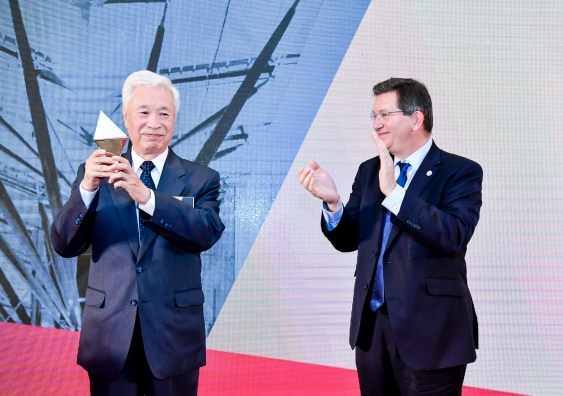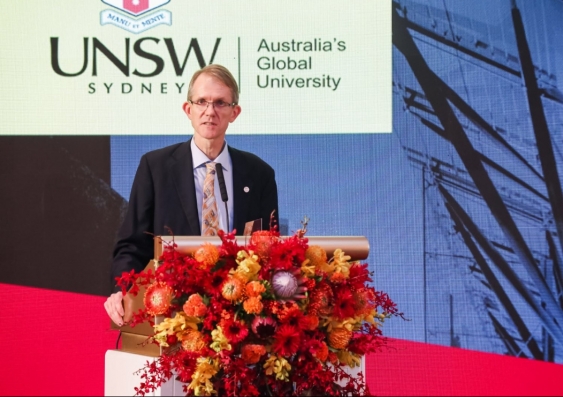UNSW Sydney celebrates strong educational links with China
UNSW leaders joined prospective students, alumni and partners in Beijing for a gala dinner and science summit to showcase the University’s broad and deep ties with China.
UNSW leaders joined prospective students, alumni and partners in Beijing for a gala dinner and science summit to showcase the University’s broad and deep ties with China.

Louise Caldicott
UNSW External Communications
0435 800 395
l.caldicott@unsw.edu.au
Leaders from UNSW Sydney held two significant events in Beijing this week celebrating seven decades of strong educational and research links between UNSW and China.
To mark the 70th anniversary of both the establishment of UNSW and the founding of the People’s Republic of China, Professor Ian Jacobs, President and Vice-Chancellor of UNSW, hosted a special dinner for future students, staff, alumni and partners on 3 September. Professor Jacobs shared the collaborative achievements UNSW has made with partners in China.
UNSW was the first university in Australia to establish a memorandum of understanding with the China Scholarship Council to provide pathways for some of China’s best and brightest research students to undertake doctoral studies in Australia.
Today, approximately 20,000 Chinese students are alumni of UNSW and the university is a preferred destination for Chinese students looking to obtain best practice and globally recognised higher education qualifications and experience.
To honour UNSW’s Chinese alumni community, an Alumni Award was presented to Professor Yang Qixun. In 1979, Professor Yang was the first student from Mainland China to study at UNSW. He is a pioneering engineer and founded Sifang Automation in 1994.
“The gala dinner was a wonderful opportunity to showcase our proud history and broad and deep connections with China stretching back 40 years,” Professor Jacobs said. “The trusted partnership that we have with China in teaching and research excellence is highly valued.”
In addition to the dinner, UNSW presented the second Sino-Australia Science Futures Summit in collaboration with the Chinese Academy of Sciences Institutes of Science and Development (CASISD) and Nature Research on 4 September.
The summit is an annual forum focusing on multi- and interdisciplinary challenges that impact research, science and economic policy formation. The aim is to provide recommendations to senior levels of government in Australia and China for the benefit of society in both countries and beyond. Both the dinner and the summit were attended by the newly appointed Australian Ambassador to China, Graham Fletcher.

Mr Graham Fletcher, newly appointed Australian Ambassador to China, attended both the gala dinner and summit in Beijing.
The theme for the 2019 summit was “Living in smart cities with 21st century technology.” Key opinion leaders, senior academics, government officials, capital investors and industry leaders discussed the innovative solutions needed for tomorrow’s smart cities.
During the summit, academics from UNSW and China presented keynote speeches and panel discussions, focusing on three of the most pressing challenges of our time: sustainability, rapid urbanisation and 21st century technology applications.
The three keynote speakers from UNSW – Professors Deo Prasad, Martin Green and Martina Stenzel – are all leaders in their field.
Professor Prasad is an international authority and recognised leader in the field of sustainable buildings and cities. He is the CEO of the Co-operative Research Centre for Low Carbon Living (CRCLCL), Australia’s largest ever industry-government-professions-research collaboration spin-off within the built environment sector.
Professor Green is a world-leading specialist in silicon solar cells, and has garnered major international awards, including the prestigious 2018 Global Energy Prize. His is the largest and best-known university-based photovoltaic research group in the world.
Professor Stenzel from the School of Chemistry is also the Co-Director of the Centre for Advanced Macromolecular Design (CAMD). Her research focuses on developing new nanoparticles for drug delivery in the treatment of cancer, as well as developing more individual and tailored cancer treatments, to improve on the existing one-size-fits-all approach.
The partnership between UNSW and CASISD has continually grown since 2009. In 2018, they entered a new partnership with Springer Nature China (Nature), to increase global promotion of Australian and Chinese research. The combination of the expertise and knowledge within the Academy, UNSW’s world-leading research and strong links to China, and Springer Nature’s credibility and channels, creates a unique opportunity to promote the capabilities of all three organisations, as well as outstanding research from Australia and China.